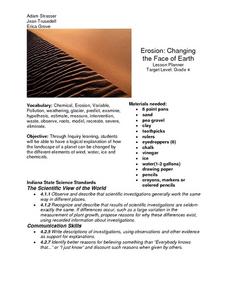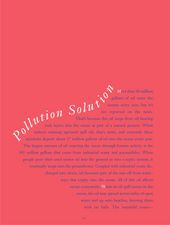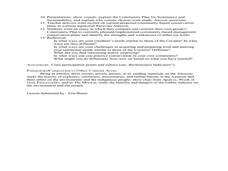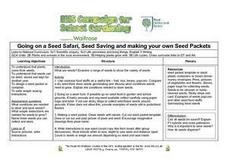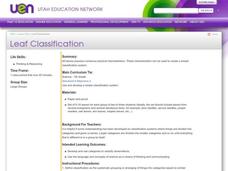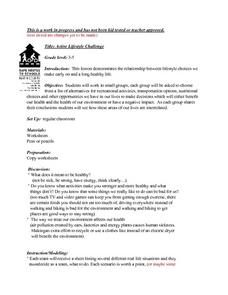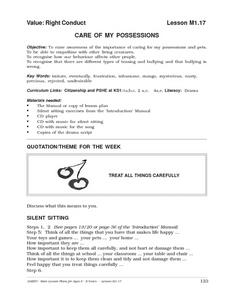Curated OER
Erosion: Changing the Face of Earth
Fourth graders explore how the landscape of the planet can be changed by different elements of wind, water, ice and chemicals through hands-on activities. They examine pictures of areas around town and discuss anything they think is out...
Curated OER
Pollution Solution!
Learners listen to the story "Clean Air, Dirty Air" by Lynne Patchett and discover the main types of pollution and how these affect their bodies. In this pollution activity, students work in small groups to create a machine to prevent...
Curated OER
Supermarkets, Sustenance and Sustainability
Students investigate jungles and the people who depend upon them. In this sustainability lesson, students research wild life conservation and discover the importance of a jungle to Amazonian people. Students create a group presentation...
Curated OER
Going on a Seed Safari
Students describe biology by identifying different plants in class. In this seed lesson, students discuss the process of how a plant grows from seed to leaves. Students attend a field trip to their garden or another park and collect a...
Curated OER
Farming in a Fishbowl: How Ethnic Groups in
Seventh graders research Chinese agricultural needs and practices. They conduct an experiment with aquaculture and germinated rice as they take measurements and apply the scientific method.
Curated OER
Resources - Can't live without them!
Students review concepts and ideas previously explored. They are reminded of what resources are, the types of resources which exist, and what role they can potentially have in international affairs.
Curated OER
Exploring Habitats
Third graders go on a mission to research three different habitats on the campus of Manchester College so that they can be part of a resuce effort. They work in groups and each group starts at a different habitat. Group one starts at...
Curated OER
A Day in the Life of a Child in Accra, Ghana
Students create a list of similarities and differences between their lives and the life of a child in Ghana. They write what a typical day would be like if they lived in Ghana.
Curated OER
Fascinating Factors
Learners observe biotic and abiotic things participating in an observational walk outside the school. They create a collage using pictures of biotic and abiotic items.
Curated OER
"Julie of the Wolves"
Fifth graders research life in Alaska and compare life there to their lives in this instructional activity. They read "Julie of the Wolves." They research through the novel and other reference books facts about the Alaskan climate and...
Curated OER
Leaf Classification
Seventh graders work together to develop a leaf classification system. In groups, they are given a set of leaves and sort them based on their characteristics. They share their new classification system with the class and answer any...
Curated OER
The Desert Alphabet Book
Students use a book to discover an interesting fact from the desert using each letter of the alphabet. Using a United States map, they identify the meanings of symbols and locate deserts within the U.S. In groups, they participate in...
Curated OER
Native American Culture
Learners investigate the lives of the American Indians who made their homes in the Midwest. In this Native American history lesson, students research the tribes of the Midwest and create PowerPoint presentations based on their research...
Curated OER
Active Lifestyle Challenge
Young scholars, in groups, choose from a list of alternatives for recreational activities, transportation options, nutritional choices and other opportunities people have in their lives to make decisions which either benefits or has a...
Curated OER
Analyzing Huck Finn: A Cooperative Learning Lesson
Pupils answer questions from "Huckleberry Finn" in groups. They use the internet or other sources to help them in their answer. They share their responses with the class and discuss.
Curated OER
Plimoth Plantation Field Trip
Take a virtual field trip to the Plymouth plantation. Using the site linked in the lesson, discover how people lived during the 17th century in this part of the country. Discuss the role of the pilgrims and native Americans in the...
Curated OER
Classified Information - Part 1: Shapes
Third graders investigate how and why scientists use classification. They discuss classification strategies using animals, and as a class fill in a flowchart with their responses. Next, in small groups they cut out a variety of shapes...
Curated OER
Care of My Possessions
Students know the importance of caring for their possessions and pets and are able to empathize with other living creatures. They have a quote of the week to follow and have questions to reflect on after story times, a silent reflection...
Curated OER
Ute Indians: Past and Present
Fourth graders study the history of the Ute Indians. In this Ute Indians lesson, 4th graders complete a KWL chart about Ute Indians and read the online Ute Indian Fact Sheet. Students study examples of Ute culture, where the Ute Indians...
Curated OER
Plant Parts
Students create a model of the parts of a plant. After reviewing the parts of a plant and their function, students working in groups, construct a plant using various provided materials. Their models are labeled and presented to the...
Curated OER
The Work of our (Divine) Hands
Young scholars explore ethical "mitzvots." In this philanthropy lesson, students consider how to lead their lives ethically according to the dogma of mitzvot. Young scholars discuss the consequences of their actions.
Curated OER
Eagle Lesson One
Third graders investigate bald eagles. They examine a map of the United States, locate states where bald eagles live, read and discuss books, and write a paragraph on how eagles are tracked.
Curated OER
Post Reading Activity: Chapter Seven
In this comprehension of text worksheet, students read a short excerpt from chapter seven entitled, She made me go. and answer three comprehension questions. Students then split into two groups to debate one side or the other on an...
Curated OER
Reading The Periodic Table
Eighth graders examine the Periodic Table. In this science lesson plan, 8th graders categorize a group of shells and unknown elements using different characteristics as they read and interpret the Periodic Table.


